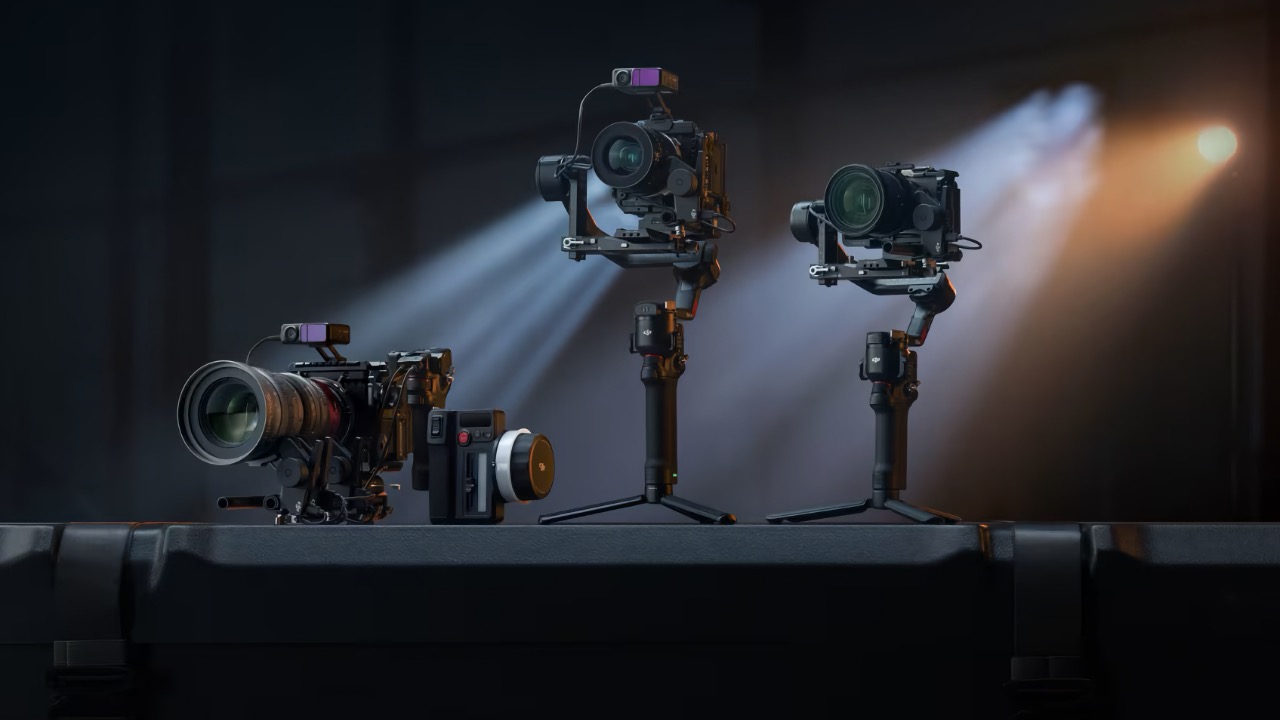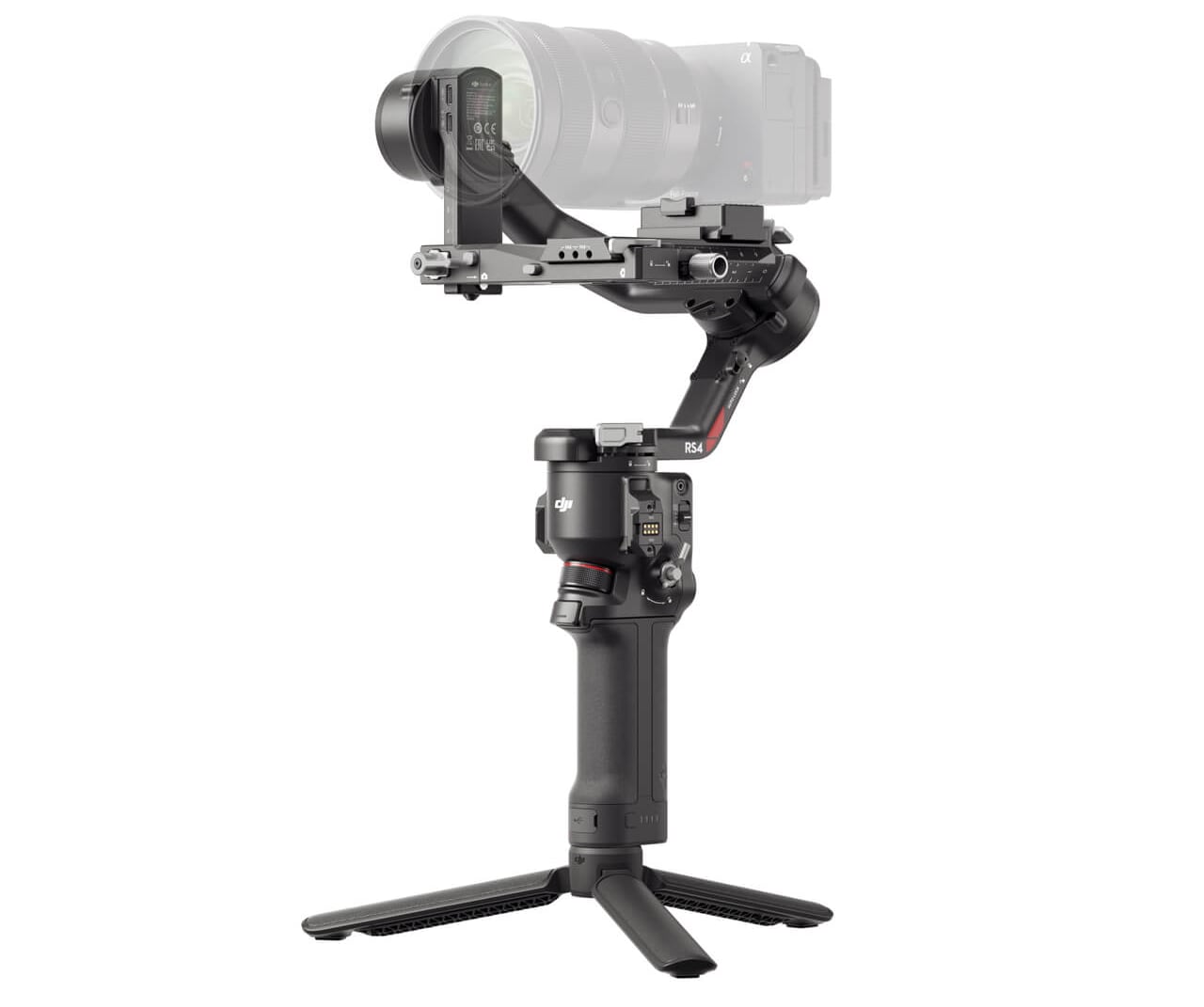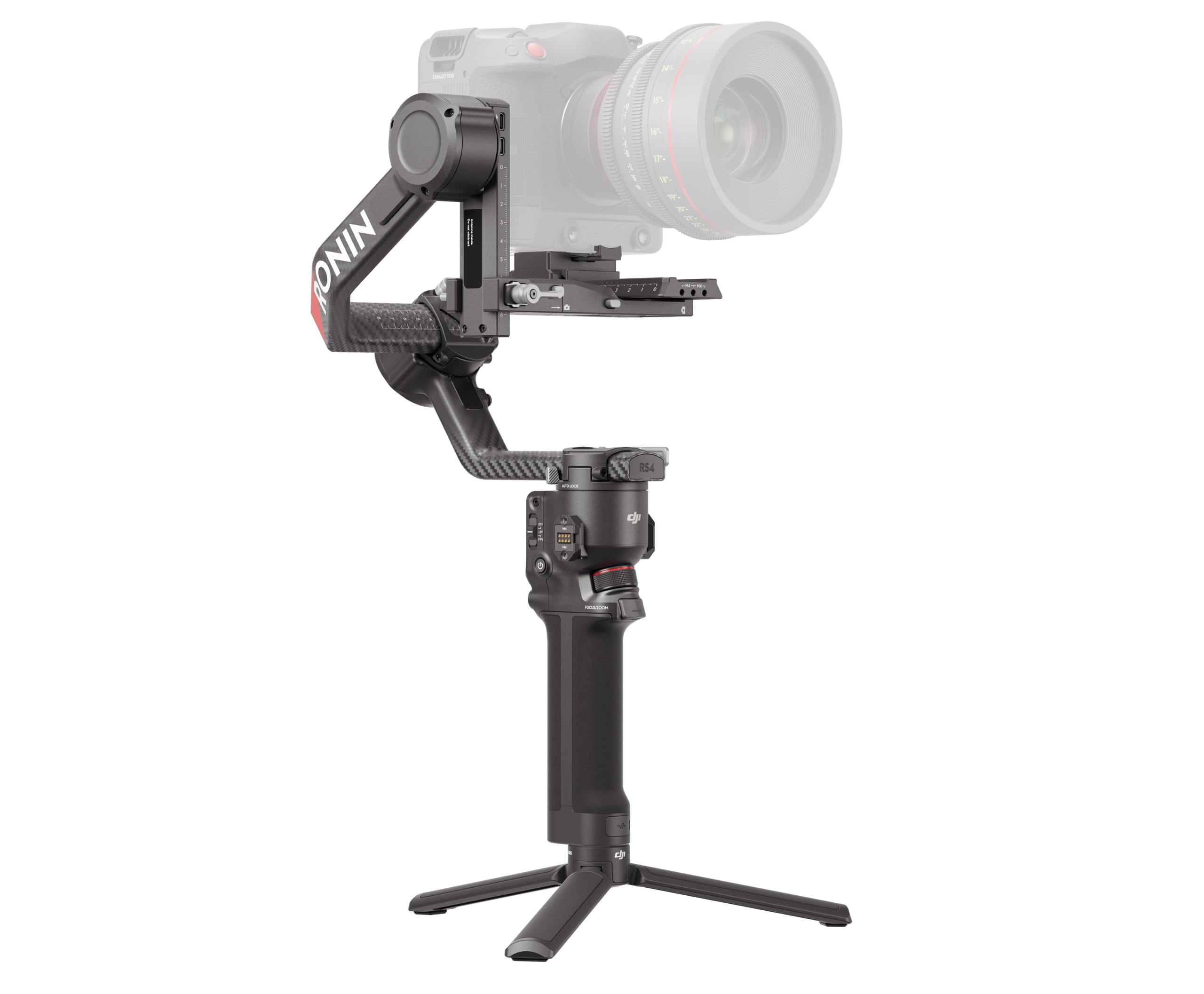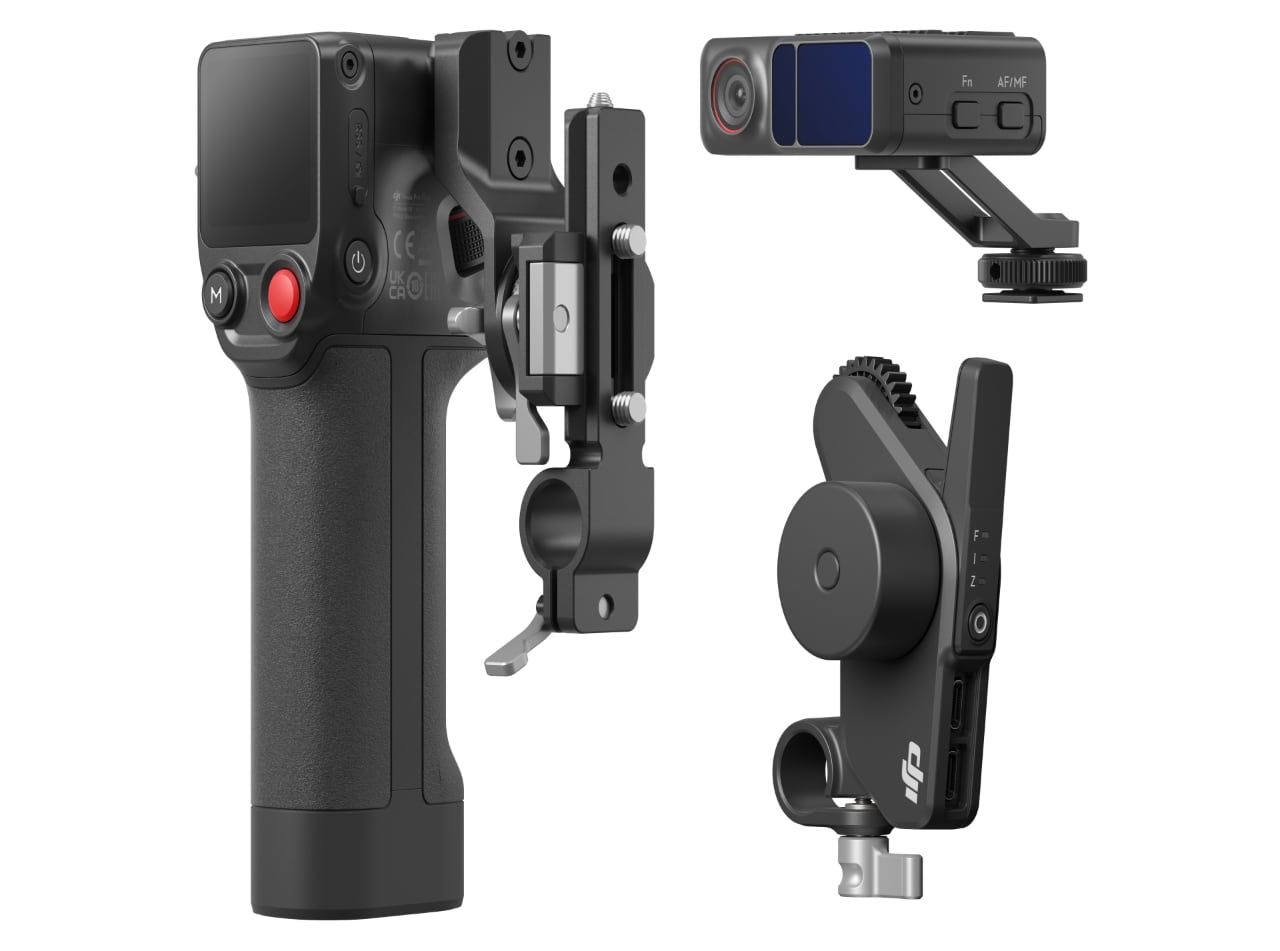
DJI says that its impressive trio of new products, the DJI RS 4, DJI RS 4 Pro, and DJI Focus Pro, deliver enhanced functionality for cinematographer.
It is the tenth anniversary of the Ronin series this year, and DJI seems keen to be starting the celebrations early.
Three new products are available with immediate effect: the DJI RS 4, a lightweight commercial stabilizer; the DJI RS 4 Pro flagship stabilizer that integrates with the DJI PRO ecosystem and offers stabilization, transmission, monitoring, focusing, and control; and the DJI Focus Pro, which it bills as the industry's first independent Automated Manual Focus (AMF) lens control system.
DJI RS 4
The DJI RS 4 can carry up to 3kg (6.6lbs) of mainstream mirrorless camera and lens combinations. With a tilt axis extended by 8.5mm compared to its predecessor, the RS 4 provides even larger balancing space, meaning that it can accommodate additional accessories such as ND filters. It features a 4th-gen stabilization algorithm and paired with the high-capacity battery grip, it offers approximately 2.5 times longer runtime.

Additionally, it offers improved stability in vertical shooting, steadying dynamic scenes like running or low-angle shots with a redesigned gimbal horizontal plate for seamless transitions to vertical shooting. An upgraded automated axis locks enable quick start-up, transitions, and storage, with minimized gimbal shakes. A Teflon coating on all three axes offers smoother balancing, while a fine-tuning knob allows precise adjustments when switching cameras or lenses. Further, an automatic screen lock feature on the OLED touchscreen prevents accidental touches and conserves battery power.
It enables remote camera shutter and lens zoom control using Dual-Mode Bluetooth technology. When paired with the DJI Focus Pro Motor (and more on that below), it allows smooth focus and lens zoom adjustments, enhancing lens control at a motor speed that is 30% faster. The new Joystick Mode Switch allows quick switching between joystick modes for zoom or gimbal control, further enhancing the user experience and efficiency on set. A customizable trigger function offers FPV mode for dynamic shooting perspectives, while the gimbal mode switch facilitates quick toggling between various modes to adapt to diverse shooting requirements. Additionally, it includes intelligent features such as Motionlapse, Track, and Panorama, empowering creators with versatile shooting capabilities.
An RSA communication port ensures enhanced connectivity with accessories such as the DJI RS Tethered Control Handle and third-party options. With the DJI RS SDK protocol, third-party developers can customize functions for the RS 4, expanding its versatility for diverse shooting requirements. Additionally, the RS 4 is compatible with the new BG70 High-Capacity Battery Grip, extending runtime to 29.5 hours with a 2.5 hour charge time, and supporting power delivery to cameras and accessories via USB-C. For
integrated shooting experiences, the RS 4 also supports the DJI Ronin Image Transmitter, offering high-definition live feeds and remote-control capabilities
DJI RS 4 Pro
Thanks in part to reliable carbon fibre design, the DJI RS 4 Pro ups the above spec to an impressive 4.5kg (10lbs) payload capacity, and features a 20% increase in motor torque across all axes to cope with the extra weight. With the addition of Car Mount mode, the stabilizer optimizes its algorithm for vehicle shoots, guaranteeing steady capture in shaky conditions.

The unit leverages the DJI Focus Pro LiDAR Autofocus system, including the Focus Pro LiDAR and Focus Pro Motor, to provide an impressive 76,800 ranging points, a leap of 77% over the previous model. As a result, the RS 4 Pro sharpens human subject edge detection while effectively reducing focus hunting. The gimbal also offers a maximum human subject focusing distance of 20m, approximately three times that of the previous generation. Additionally, DJI says the Next-Gen ActiveTrack Pro utilizes advanced AI algorithms and LiDAR technology to ensure steadfast subject tracking, even in challenging conditions. Dual Focus & Zoom Motors, combined with the DJI Focus Pro Motor, provide native and precise lens control.
The remote-control system allows for remote gimbal operation and intelligent focus assistance. In collaborative team shooting, the gimbal operator can control the RS 4 Pro gimbal through devices such as the DJI Master Wheels, DJI Ronin 4D Hand Grips, and DJI High-Bright Remote Monitor. Meanwhile, the focus puller can enable LiDAR Waveform on the High-Bright Remote Monitor for intelligent focus assistance, precisely controlling focus using the Focus Pro Hand Unit.
With the DJI Focus Pro LiDAR to DJI Transmission Cable Hub, seamless integrated setting and power supply can also be achieved, and the DJI RS 4 Pro can power the Focus Pro LiDAR and DJI Video Transmitter simultaneously. The RS 4 Pro also supports various handheld configurations and professional solutions through the DJI RS SDK protocol, enabling innovative solutions for car mounts, jibs, Steadicams, cable cams, and sliders, ensuring versatile and efficient creative workflows for cinematographers.
DJI Focus Pro
The DJI Focus Pro is DJI's first independent LiDAR focus system available to all cinematographers. The all-new DJI Focus Pro Grip offers exceptional versatility with a 2.5-hour system power supply, intuitive visual operations, auto-calibration and data storage for 15 lenses, as well as Bluetooth connectivity for seamless start/stop recording. Equipped with a full-color touchscreen, the Grip allows operators to adjust LiDAR and motor parameters while providing a real-time view from the LiDAR's perspective, ensuring complete awareness during use.

The spec is pretty much as per that in the DJI RS 4 Pro. A modular design of the Focus Pro system, comprising LiDAR, Motor, Grip, and Hand Unit modules, offers flexibility while it is well worth talking about AMF mode, available in both the Hand Unit and Grip. With AMF focus transition and AMF focus lock, this provides tactile feedback and millisecond-level switching between manual and auto focus. Additionally, the DJI Focus Pro LiDAR empowers cinematographers with intuitive spatial understanding by using LiDAR waveform as focus assistance, enhancing their ability to capture scenes with precision.
The Magnetic Damping FIZ Hand Unit transforms focus, iris, and zoom control for focus pullers, enhancing teamwork efficiency in capturing complex scenes. Featuring stepless real-time damping coefficient adjustments and electronic A-B point marking mode, the Focus Pro Hand Unit ensures precision and convenience in focus control, while offering a communication distance of 160m. Enabled with Bluetooth start/stop recording, it facilitates wireless control with mirrorless cameras. The accompanying FIZ Motor delivers significantly improved performance, boasting a 30% faster motor speed, 10ms low latency, and three-level adjustable torque, ensuring smoother operation and versatile cinematic language opportunities. Compatible with 15mm rods, the motor offers more mounting options. The Magnetic Damping Grip complements the unit, allowing seamless transition between focus and zoom control, with adjustable damping feedback for enhanced tactile experience.
Pricing and availability
All the above is available with immediate effect from the DJI store and usual outlets. The DJI RS 4 starts at $549, the DJI RS 4 Pro at $869, and the DJI Focus Pro is $999 for all three module. Various bundles and combinations are available. Check out https://store.dji.com/ for details.
Tags: Production DJI NAB 2024


Comments